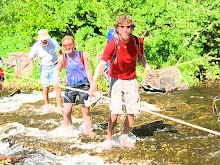Over two thousand years after his death, Alexander the Great still carries a hefty political legacy in this part of the world. Despite the fact that he was neither Slavic, like present-day Macedonians, nor Greek, both sides claim him and he is particularly emblematic of the currently tense state of relations between the countries. Because his kingdom, Macedon, included an area encompassing both Macedonia and northern Greece (which the Greeks refer to as “Macedonia”), there’s always been a lot of historical tug o’ war. The most obvious example of this today is the dispute over Macedonia’s official name, which you can read more about here.
I bring this up because once again we were reminded of this game of keep-away with Alexander when we hiked to Devil’s Wall, near the town of Sveti Nikola (Saint Nicholas). It was an absolutely beautiful day, with temperatures pushing 60 degrees, when we set out with a group of other volunteers. The legend behind Devil’s Wall, which is located along the side of a small mountain, is that it is the remnants of a structure built by Alexander’s army to protect his treasures. Or is it simply a natural formation that lends itself to myth-making?
From a distance it didn’t look like much, but as we approached, it increasingly began to resemble a wall, constructed from separately cut stones. Plus, it stands in considerable contrast to the other surrounding rocks in both texture and color, and pretty soon we were all scratching our heads. Here’s the wall…what do you think?

 Well, we won’t keep you in suspense. Luckily for us, two members of the group had asked a local museum curator and received the skinny: American and European archaeologists studied the wall during the 1960’s and determined that it is, in fact, not man-made.
Well, we won’t keep you in suspense. Luckily for us, two members of the group had asked a local museum curator and received the skinny: American and European archaeologists studied the wall during the 1960’s and determined that it is, in fact, not man-made.

The church in Sveti Nikola
Now that training is winding down, excitement and anxiety are running high as reality is setting in: we are going to be on our own soon. Language classes continue to go well, but at times we are frustrated by our language limitations. There are times when we can carry on whole conversations in Macedonian, and other times when we struggle to answer simple questions. Accents, dialects, rate and volume of speakers, new tenses, and phrasing all can stifle our attempts to communicate--not to mention the abundance of vocabulary that we have yet to learn. Next week, we have our final oral language assessment. It is basically just a conversation with one of the language teachers where he/she asks us questions in Macedonian. The object is to speak fluidly--and quantity counts. So don't be surprised if your ears are burning next week as we speak of your professions, hair color and birth places.

 Well, we won’t keep you in suspense. Luckily for us, two members of the group had asked a local museum curator and received the skinny: American and European archaeologists studied the wall during the 1960’s and determined that it is, in fact, not man-made.
Well, we won’t keep you in suspense. Luckily for us, two members of the group had asked a local museum curator and received the skinny: American and European archaeologists studied the wall during the 1960’s and determined that it is, in fact, not man-made. The church in Sveti Nikola
The church in Sveti Nikola

2 comments:
Zdrova, Dan and Jillian, I don't care what the museum Curator said, I think that the wall was built by the Romans or someone with that ability. A Geologist would be better equipted to explain the origin of the wall. I can only imagine what it would be like to learn an entirely new language at this time in your life. Being stationed in the country of that language has got to be the greatest benifit of all. With your collective perseverance,in the ext two years I'm sure that you both will be fluent in the Macedonian language and be able to wow us with your newfound knowledge. Love to you both. Grandpa
I always say - when in doubt go for the good story - sometimes the truth is just so boring! Good luck on the language tests!
Love,
Mom
Post a Comment